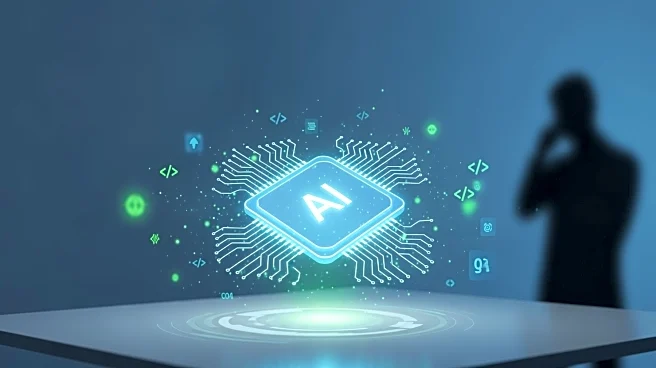What's Happening?
Tech CEOs from companies like Anthropic, Meta, Amazon, Google, and Microsoft are making bold claims about the potential of AI to transform software development. They suggest that AI could soon be responsible
for writing a significant portion of code, with Anthropic's CEO predicting that AI could write 90% of code within months. However, many software engineers express skepticism about these claims. Engineers like Colton Voege and Simon Willison acknowledge that while AI can assist in coding, it still requires human oversight and cannot replace the problem-solving skills of experienced developers. AI tools, such as those developed by Anthropic, can automate certain coding tasks but often require human intervention to resolve issues.
Why It's Important?
The debate over AI's role in software development has significant implications for the tech industry. If AI can indeed take over a large portion of coding tasks, it could lead to increased efficiency and reduced costs for companies. However, the skepticism among engineers highlights potential challenges, such as the need for human oversight and the risk of over-reliance on AI. This could impact employment in the tech sector, particularly for junior developers, and raise concerns about the quality and reliability of AI-generated code. The industry's push towards AI-driven development also reflects broader trends in automation and the future of work.
What's Next?
As AI tools continue to evolve, companies may increasingly integrate them into their development processes. This could lead to changes in hiring practices, with a potential reduction in entry-level coding positions. Companies might also invest in training programs to help engineers adapt to working alongside AI. The ongoing development of AI tools will likely prompt further discussions about the ethical and practical implications of AI in software engineering, including issues related to job displacement and the need for robust oversight mechanisms.
Beyond the Headlines
The integration of AI in coding raises ethical and cultural questions about the future of work and the role of human creativity in technology. As AI tools become more prevalent, there may be a shift in how software development is perceived, with a greater emphasis on collaboration between humans and machines. This could lead to new models of work and innovation, as well as discussions about the value of human input in an increasingly automated world.











